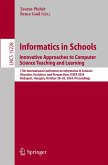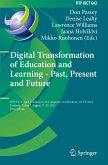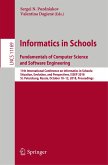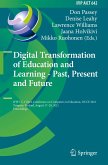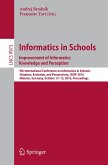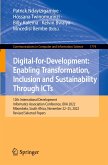Digitally Transformed Education: Are We There Yet?
4th IFIP TC 3 Open Conference on Computers in Education, OCCE 2024, Bournemouth, UK, February 27 - March 1, 2024, Revised Selected Papers
Herausgegeben:Leahy, Margaret; Reffay, Christophe
Digitally Transformed Education: Are We There Yet?
4th IFIP TC 3 Open Conference on Computers in Education, OCCE 2024, Bournemouth, UK, February 27 - March 1, 2024, Revised Selected Papers
Herausgegeben:Leahy, Margaret; Reffay, Christophe
- Gebundenes Buch
- Merkliste
- Auf die Merkliste
- Bewerten Bewerten
- Teilen
- Produkt teilen
- Produkterinnerung
- Produkterinnerung
This book constitutes the refereed post-conference proceedings of the 4th IFIP TC 3 Open Conference on Computers in Education, OCCE 2024, held in Bournemouth, UK, during February 27 March 1, 2024.
The 22 full papers and 3 short papers included in this volume were carefully reviewed and selected from 72 submissions. They were organized in topical sections as follows: Digital Education in Schools, Higher Education and Communities; Computing Education in Schools and Higher Education; and Contributions of IFIP TC3 to Digital Education.
Andere Kunden interessierten sich auch für
![Informatics in Schools. Innovative Approaches to Computer Science Teaching and Learning Informatics in Schools. Innovative Approaches to Computer Science Teaching and Learning]() Informatics in Schools. Innovative Approaches to Computer Science Teaching and Learning38,99 €
Informatics in Schools. Innovative Approaches to Computer Science Teaching and Learning38,99 €![Digital Transformation of Education and Learning - Past, Present and Future Digital Transformation of Education and Learning - Past, Present and Future]() Digital Transformation of Education and Learning - Past, Present and Future67,99 €
Digital Transformation of Education and Learning - Past, Present and Future67,99 €![Cultivating Future-Oriented Learners Cultivating Future-Oriented Learners]() Cultivating Future-Oriented Learners119,99 €
Cultivating Future-Oriented Learners119,99 €![Informatics in Schools. Fundamentals of Computer Science and Software Engineering Informatics in Schools. Fundamentals of Computer Science and Software Engineering]() Informatics in Schools. Fundamentals of Computer Science and Software Engineering38,99 €
Informatics in Schools. Fundamentals of Computer Science and Software Engineering38,99 €![Digital Transformation of Education and Learning - Past, Present and Future Digital Transformation of Education and Learning - Past, Present and Future]() Digital Transformation of Education and Learning - Past, Present and Future67,99 €
Digital Transformation of Education and Learning - Past, Present and Future67,99 €![Informatics in Schools: Improvement of Informatics Knowledge and Perception Informatics in Schools: Improvement of Informatics Knowledge and Perception]() Informatics in Schools: Improvement of Informatics Knowledge and Perception38,99 €
Informatics in Schools: Improvement of Informatics Knowledge and Perception38,99 €![Digital-for-Development: Enabling Transformation, Inclusion and Sustainability Through ICTs Digital-for-Development: Enabling Transformation, Inclusion and Sustainability Through ICTs]() Digital-for-Development: Enabling Transformation, Inclusion and Sustainability Through ICTs60,99 €
Digital-for-Development: Enabling Transformation, Inclusion and Sustainability Through ICTs60,99 €-
-
-
This book constitutes the refereed post-conference proceedings of the 4th IFIP TC 3 Open Conference on Computers in Education, OCCE 2024, held in Bournemouth, UK, during February 27 March 1, 2024.
The 22 full papers and 3 short papers included in this volume were carefully reviewed and selected from 72 submissions. They were organized in topical sections as follows: Digital Education in Schools, Higher Education and Communities; Computing Education in Schools and Higher Education; and Contributions of IFIP TC3 to Digital Education.
The 22 full papers and 3 short papers included in this volume were carefully reviewed and selected from 72 submissions. They were organized in topical sections as follows: Digital Education in Schools, Higher Education and Communities; Computing Education in Schools and Higher Education; and Contributions of IFIP TC3 to Digital Education.
Produktdetails
- Produktdetails
- IFIP Advances in Information and Communication Technology 734
- Verlag: Springer / Springer Nature Switzerland / Springer, Berlin
- Artikelnr. des Verlages: 978-3-031-88743-7
- Seitenzahl: 300
- Erscheinungstermin: 26. April 2025
- Englisch
- Abmessung: 241mm x 160mm x 22mm
- Gewicht: 615g
- ISBN-13: 9783031887437
- ISBN-10: 3031887433
- Artikelnr.: 73430511
- Herstellerkennzeichnung Die Herstellerinformationen sind derzeit nicht verfügbar.
- IFIP Advances in Information and Communication Technology 734
- Verlag: Springer / Springer Nature Switzerland / Springer, Berlin
- Artikelnr. des Verlages: 978-3-031-88743-7
- Seitenzahl: 300
- Erscheinungstermin: 26. April 2025
- Englisch
- Abmessung: 241mm x 160mm x 22mm
- Gewicht: 615g
- ISBN-13: 9783031887437
- ISBN-10: 3031887433
- Artikelnr.: 73430511
- Herstellerkennzeichnung Die Herstellerinformationen sind derzeit nicht verfügbar.
.- Digital Education in Schools, Higher Education and Communities.
.- Shapes of Data Literacy in Germany s Higher Educational Landscape: An Empirical Snapshot of an Emergent Discipline.
.- Professional Development for Teachers in Artificial Intelligence and Data Literacy.
.- Lecturers Perspectives Regarding AI Competencies for Non-Computer Science Students in Undergraduate Education.
.- Media Literacy Learning with Social Media Simulators and the Formation of Learner s Attitude.
.- Teachers Insight: Digital Threats that Imperil Children and Teenagers.
.- Improving Transparency in School Admission Web Forms Through User-Centric Privacy Notices A Privacy by Design Perspective.
.- Designing a Learning Environment to Foster Competencies in Information Systems through Business Games.
.- co.LAB: a Web Platform Dedicated to the Design and Evaluation of Learning Games.
.- Exploring collaborative learning through a virtual software engineering course.
.- Virtual Haptic Simulators: Diversifying the Technologies to Enhance Teaching and Learning in Higher Education.
.- Turning Technophobia into Technophilia: A Study on Academic Staff at the University of Latvia.
.- Empowering Marginalized Communities through Digital Education: Building a Research Framework Based on the Capability Approach.
.- EduAbility: An assistive technology awareness and training package.
.- Computing Education in Schools and Higher Education.
.- Informatics Competencies for All Teachers Development of Recommendations for Teacher Education.
.- Towards Success Factors for Informatics Modules in Teacher Education.
.- Success Factors of a Large-Scale In-Service Teacher Training in Computer Science.
.- Computer Science for All: Teacher Training for In-service Teachers.
.- The Role of Tables in Computational Thinking and Mathematical Thinking.
.- Teachers Notions of Computing-Related Concepts in Digital Games Popular among Secondary School Students.
.- Exploring Computational Thinking as a Predictor to Identify Conceptual Understanding of Programming.
.- A System for Programming Examinations with Block Components.
.- How is the Gender Image of Programming Different from Other Subjects? A Quantitative Study for Japanese Students.
.- Examining the Subtlety of Gender Bias in the Australian Digital Technologies Curriculum.
.- Contributions of IFIP TC3 to Digital Education.
.- The Contribution of the Official TC3 Journal (EAIT) to Digital Education and Learning during the Global Health Emergency.
.- The Contribution IFIP WG3.4 has made over 40 Years to Developments in Higher, Vocational, and Lifelong Learning.
.- Shapes of Data Literacy in Germany s Higher Educational Landscape: An Empirical Snapshot of an Emergent Discipline.
.- Professional Development for Teachers in Artificial Intelligence and Data Literacy.
.- Lecturers Perspectives Regarding AI Competencies for Non-Computer Science Students in Undergraduate Education.
.- Media Literacy Learning with Social Media Simulators and the Formation of Learner s Attitude.
.- Teachers Insight: Digital Threats that Imperil Children and Teenagers.
.- Improving Transparency in School Admission Web Forms Through User-Centric Privacy Notices A Privacy by Design Perspective.
.- Designing a Learning Environment to Foster Competencies in Information Systems through Business Games.
.- co.LAB: a Web Platform Dedicated to the Design and Evaluation of Learning Games.
.- Exploring collaborative learning through a virtual software engineering course.
.- Virtual Haptic Simulators: Diversifying the Technologies to Enhance Teaching and Learning in Higher Education.
.- Turning Technophobia into Technophilia: A Study on Academic Staff at the University of Latvia.
.- Empowering Marginalized Communities through Digital Education: Building a Research Framework Based on the Capability Approach.
.- EduAbility: An assistive technology awareness and training package.
.- Computing Education in Schools and Higher Education.
.- Informatics Competencies for All Teachers Development of Recommendations for Teacher Education.
.- Towards Success Factors for Informatics Modules in Teacher Education.
.- Success Factors of a Large-Scale In-Service Teacher Training in Computer Science.
.- Computer Science for All: Teacher Training for In-service Teachers.
.- The Role of Tables in Computational Thinking and Mathematical Thinking.
.- Teachers Notions of Computing-Related Concepts in Digital Games Popular among Secondary School Students.
.- Exploring Computational Thinking as a Predictor to Identify Conceptual Understanding of Programming.
.- A System for Programming Examinations with Block Components.
.- How is the Gender Image of Programming Different from Other Subjects? A Quantitative Study for Japanese Students.
.- Examining the Subtlety of Gender Bias in the Australian Digital Technologies Curriculum.
.- Contributions of IFIP TC3 to Digital Education.
.- The Contribution of the Official TC3 Journal (EAIT) to Digital Education and Learning during the Global Health Emergency.
.- The Contribution IFIP WG3.4 has made over 40 Years to Developments in Higher, Vocational, and Lifelong Learning.
.- Digital Education in Schools, Higher Education and Communities.
.- Shapes of Data Literacy in Germany s Higher Educational Landscape: An Empirical Snapshot of an Emergent Discipline.
.- Professional Development for Teachers in Artificial Intelligence and Data Literacy.
.- Lecturers Perspectives Regarding AI Competencies for Non-Computer Science Students in Undergraduate Education.
.- Media Literacy Learning with Social Media Simulators and the Formation of Learner s Attitude.
.- Teachers Insight: Digital Threats that Imperil Children and Teenagers.
.- Improving Transparency in School Admission Web Forms Through User-Centric Privacy Notices A Privacy by Design Perspective.
.- Designing a Learning Environment to Foster Competencies in Information Systems through Business Games.
.- co.LAB: a Web Platform Dedicated to the Design and Evaluation of Learning Games.
.- Exploring collaborative learning through a virtual software engineering course.
.- Virtual Haptic Simulators: Diversifying the Technologies to Enhance Teaching and Learning in Higher Education.
.- Turning Technophobia into Technophilia: A Study on Academic Staff at the University of Latvia.
.- Empowering Marginalized Communities through Digital Education: Building a Research Framework Based on the Capability Approach.
.- EduAbility: An assistive technology awareness and training package.
.- Computing Education in Schools and Higher Education.
.- Informatics Competencies for All Teachers Development of Recommendations for Teacher Education.
.- Towards Success Factors for Informatics Modules in Teacher Education.
.- Success Factors of a Large-Scale In-Service Teacher Training in Computer Science.
.- Computer Science for All: Teacher Training for In-service Teachers.
.- The Role of Tables in Computational Thinking and Mathematical Thinking.
.- Teachers Notions of Computing-Related Concepts in Digital Games Popular among Secondary School Students.
.- Exploring Computational Thinking as a Predictor to Identify Conceptual Understanding of Programming.
.- A System for Programming Examinations with Block Components.
.- How is the Gender Image of Programming Different from Other Subjects? A Quantitative Study for Japanese Students.
.- Examining the Subtlety of Gender Bias in the Australian Digital Technologies Curriculum.
.- Contributions of IFIP TC3 to Digital Education.
.- The Contribution of the Official TC3 Journal (EAIT) to Digital Education and Learning during the Global Health Emergency.
.- The Contribution IFIP WG3.4 has made over 40 Years to Developments in Higher, Vocational, and Lifelong Learning.
.- Shapes of Data Literacy in Germany s Higher Educational Landscape: An Empirical Snapshot of an Emergent Discipline.
.- Professional Development for Teachers in Artificial Intelligence and Data Literacy.
.- Lecturers Perspectives Regarding AI Competencies for Non-Computer Science Students in Undergraduate Education.
.- Media Literacy Learning with Social Media Simulators and the Formation of Learner s Attitude.
.- Teachers Insight: Digital Threats that Imperil Children and Teenagers.
.- Improving Transparency in School Admission Web Forms Through User-Centric Privacy Notices A Privacy by Design Perspective.
.- Designing a Learning Environment to Foster Competencies in Information Systems through Business Games.
.- co.LAB: a Web Platform Dedicated to the Design and Evaluation of Learning Games.
.- Exploring collaborative learning through a virtual software engineering course.
.- Virtual Haptic Simulators: Diversifying the Technologies to Enhance Teaching and Learning in Higher Education.
.- Turning Technophobia into Technophilia: A Study on Academic Staff at the University of Latvia.
.- Empowering Marginalized Communities through Digital Education: Building a Research Framework Based on the Capability Approach.
.- EduAbility: An assistive technology awareness and training package.
.- Computing Education in Schools and Higher Education.
.- Informatics Competencies for All Teachers Development of Recommendations for Teacher Education.
.- Towards Success Factors for Informatics Modules in Teacher Education.
.- Success Factors of a Large-Scale In-Service Teacher Training in Computer Science.
.- Computer Science for All: Teacher Training for In-service Teachers.
.- The Role of Tables in Computational Thinking and Mathematical Thinking.
.- Teachers Notions of Computing-Related Concepts in Digital Games Popular among Secondary School Students.
.- Exploring Computational Thinking as a Predictor to Identify Conceptual Understanding of Programming.
.- A System for Programming Examinations with Block Components.
.- How is the Gender Image of Programming Different from Other Subjects? A Quantitative Study for Japanese Students.
.- Examining the Subtlety of Gender Bias in the Australian Digital Technologies Curriculum.
.- Contributions of IFIP TC3 to Digital Education.
.- The Contribution of the Official TC3 Journal (EAIT) to Digital Education and Learning during the Global Health Emergency.
.- The Contribution IFIP WG3.4 has made over 40 Years to Developments in Higher, Vocational, and Lifelong Learning.



